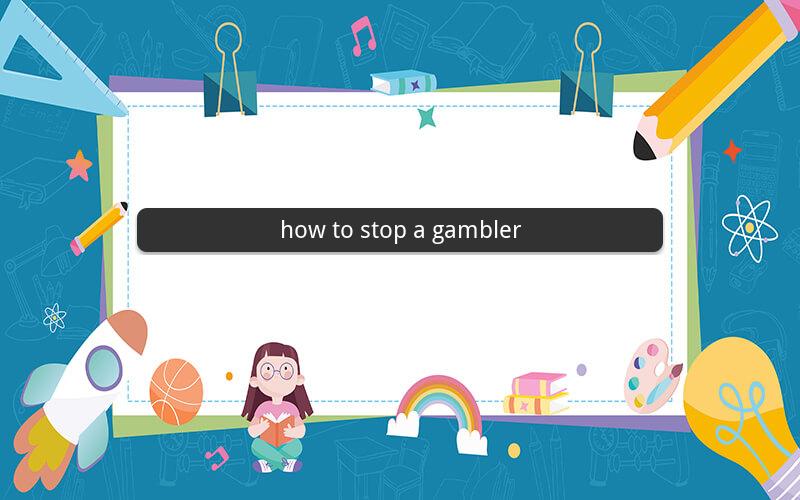
How to Stop a Gambler: Strategies and Support
Table of Contents
1. Understanding the Problem
2. Identifying Signs of Problem Gambling
3. The Importance of Support Systems
4. Communicating with the Gambler
5. Setting Boundaries and Limits
6. Encouraging Professional Help
7. Financial Strategies to Manage Gambling Debt
8. Creating a Safe Environment
9. Education and Awareness
10. Long-Term Solutions
1. Understanding the Problem
Problem gambling, also known as compulsive gambling, is a behavioral addiction that can lead to severe consequences for individuals and their families. It is essential to recognize the signs of problem gambling and understand the underlying causes to effectively address the issue.
2. Identifying Signs of Problem Gambling
Recognizing the signs of problem gambling is the first step towards helping a loved one. These signs may include:
- Increased time spent on gambling activities
- Lying about gambling habits
- Borrowing money to fund gambling
- Neglecting personal responsibilities
- Emotional and financial distress
- Engaging in risky behaviors to win back lost money
3. The Importance of Support Systems
Support from friends, family, and professionals is crucial in helping a gambler overcome their addiction. Building a strong support network can provide the encouragement and guidance needed for recovery.
4. Communicating with the Gambler
Effective communication is key to helping a gambler acknowledge their problem and seek help. Here are some tips for communicating with a gambler:
- Choose a calm and private setting
- Express concern without judgment or confrontation
- Use "I" statements to avoid sounding accusatory
- Listen actively and without interruption
- Offer support and reassurance
5. Setting Boundaries and Limits
Setting clear boundaries and limits can help prevent a gambler from continuing their harmful behavior. This may include:
- Limiting access to gambling websites and apps
- Restricting financial access to gambling funds
- Establishing consequences for non-compliance
6. Encouraging Professional Help
Seeking professional help is a crucial step in overcoming problem gambling. Therapists, counselors, and support groups can provide tailored strategies and support for recovery.
7. Financial Strategies to Manage Gambling Debt
Managing gambling debt is an important aspect of recovery. Here are some financial strategies to consider:
- Contacting creditors for debt consolidation or restructuring
- Selling unnecessary assets to pay off debts
- Creating a budget to manage expenses and prioritize debt repayment
8. Creating a Safe Environment
A safe and supportive environment can help a gambler stay on track with their recovery. This may involve:
- Removing gambling-related items from the home
- Encouraging participation in healthy activities
- Celebrating milestones and progress
9. Education and Awareness
Educating oneself and others about problem gambling can help prevent its occurrence and support those affected. This includes:
- Attending workshops and seminars
- Sharing resources and information with loved ones
- Advocating for policies that protect vulnerable populations
10. Long-Term Solutions
Long-term solutions are essential to prevent relapse and maintain recovery. These may include:
- Continued therapy and counseling
- Participating in support groups
- Developing healthy coping mechanisms
- Maintaining a strong support network
---
10 Questions and Answers
1. Question: What are the common reasons for problem gambling?
Answer: Common reasons include stress, boredom, the thrill of risk, and the desire to escape reality.
2. Question: Can problem gambling be treated?
Answer: Yes, problem gambling can be treated through therapy, counseling, and support groups.
3. Question: How can I help a loved one who is struggling with problem gambling?
Answer: Offer support, encourage them to seek professional help, and help them set boundaries.
4. Question: What are some signs that a person might be a problem gambler?
Answer: Signs include lying about gambling, borrowing money, and neglecting personal responsibilities.
5. Question: Can a person overcome problem gambling on their own?
Answer: While some may overcome problem gambling independently, seeking professional help often increases the chances of successful recovery.
6. Question: What are some financial consequences of problem gambling?
Answer: Financial consequences may include debt, loss of assets, and potential legal issues.
7. Question: How can I help someone who is struggling with gambling debt?
Answer: Encourage them to seek financial counseling and help them develop a plan to manage and pay off their debt.
8. Question: What is the role of support groups in problem gambling recovery?
Answer: Support groups provide a community of peers who share similar experiences, offering emotional support and practical advice.
9. Question: How can I prevent someone from relapsing into problem gambling?
Answer: Encourage ongoing therapy, provide ongoing support, and help them develop healthy coping mechanisms.
10. Question: What are some long-term solutions for problem gambling?
Answer: Long-term solutions include continued therapy, participation in support groups, and maintaining a healthy lifestyle.